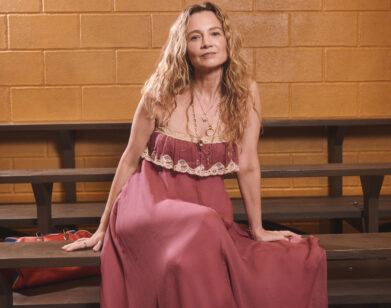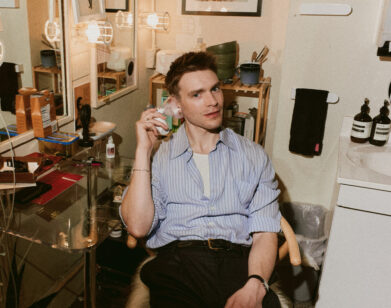BACKSTAGE
“Aren’t These Plays For Everyone?”: Behind the Scenes of BAM’s Macbeth in Stride
When multihyphenate Broadway diva Whitney White first conceived of her latest project, Macbeth in Stride, she had one goal. “I’m trying to surf the wave of Black feminine embodiment as I experience it,” she told me the day after the show’s opening night at the Brooklyn Academy of Music. Raja Feather Kelly, the production’s choreographer, chimed in from Montreal, where he was already hard at work on another project. “My interest was always making sure that the women felt real and felt sexy and that they didn’t have to perform or create sexiness out of nothing,” he said. A reimagining of Shakespeare’s most iconic female villain, Macbeth in Stride lays out 90 minutes of sexy musical numbers embedded with a larger, systemic critique of the ways powerful women have been maligned through history. Last week, at the beginning of its two-week run, the show left theatre patrons celebrating female ambition and how good it feels to be bad. Before White got back on stage for her second of eleven performances, she and Kelly joined us to talk about their all-time favorite “nasty” women, breaking the rules of live theater, and what it means to bring The Great Bard to Brooklyn.
———
ARY RUSSELL: Do you guys have a show tonight?
WHITNEY WHITE: Yeah, we do. I just had a burger and fries. We had a little rehearsal cleaning up some things in the show, and we’ll do it again tonight. I’m always sad when rehearsal’s over because the directors leave and it’s a smaller crew.
RUSSELL: I was surprised last night when Raja said, “No, I just came for the opening night, but I’ve got to go.”
RAJA FEATHER KELLY: Hey, guys!
RUSSELL: Are you in Canada now?
KELLY: Yeah, I’m in Montreal.
RUSSELL: How are you feeling the day after opening night?
WHITE: Oh my gosh. I always feel like opening nights are such a miracle, because you’re like, “Are we going to make it through? Are people going to stay? Is someone going to throw a tomato at me?” So I always wake up the day after opening kind of grateful we even made it through.
KELLY: I said this to you yesterday, but what’s particular about this show is that it’s like a homecoming. I feel really jazzed because Whitney is out here directing everybody’s play and musical, but it’s very rare when you’re also a generative artist for people to see what you do. They’re about to see Whitney go off and also the witches and also Charlie and also the band.
RUSSELL: Obviously, this is Macbeth In Stride. You both know the old maxim, “You can’t say Macbeth in a theater.” How did you guys get around that?
WHITE: Well, I think the whole show is such a reclamation of the spirituality and symbolism of the witches in the piece that it’s like, if anything, we’ll say it double. “Double, double toil in trouble.” We are the wives’ tale.
RUSSELL: How close to opening night are you still tweaking and making changes?
WHITE: Raja, you want to answer that?
KELLY: What I love about this collaboration in particular is that Macbeth In Stride is a living being right? Even up until the last song, “Live Not Dead, Not Dead,” and I think that speaks to Lady Macbeth, that speaks to Whitney White, and it speaks to the production—it’s not always about the tweaks for perfection, but just that it’s a living thing. So we should continue to learn and it should continue to grow and be attended to like it’s a plant. It needs to be pruned. It needs what it needs. So I offer that anytime. If it’s opening night or if it’s two minutes before curtain or if we’ve been doing it for 20 years, it needs what it needs.
WHITE: You have to keep trying to make it as fresh and necessary and excellent as possible. So we have to hold on to the technical elements because after a while, they stop paying people to help you do the show, but we are always reaching for it.
RUSSELL: I have a question about the decision to do a Shakespeare adaptation. Sometimes it can feel like Shakespeare is a little inaccessible, so it’s really, really interesting how you’ve brought Macbeth back to the community, back to Brooklyn. I was curious if you could give any insight about what that feels like.
WHITE: I love that question. I mean, I have done my fair amount of study on the Great Bard. I like to call him that. And it’s interesting, he made this collection of plays, this canon of work that looks at everything from kings and queens to laymen to people to prostitutes to women lost in the forest. Really, the whole world is the stage for him; that is both a line from one of the plays, but also very true. If all these kinds of people are in the world, then aren’t these plays for everyone, for all kinds of people? The plays are not just about the upper class. The plays are very much about humanity, so it’s just my desire that humanity be invited to the play, and that might mean we need to do it a certain way or a different way to invite other people back into the stories, but that’s kind of why I chose to do it.
KELLY: I will also add that something that I have learned over the course of this is that Black people have a vernacular and Shakespeare has vernacular. And what has been interesting is watching these two vernaculars interact with one another in a way that another adaptation from someone who is not Black would not be the same because they’re not competing. The amount of times I heard people saying, “Mmm…” And you’re like, they’re saying that not because they’re like, “Wow, William Shakespeare really did it on that line.” They’re saying that because they’re like, “Wow, this woman is speaking to me in a way that I understand about what I know inherently and deeply within my soul and body and that’s pretty fucking cool.”
RUSSELL: Yeah, and when you talk about Black people having a certain vernacular, that also invites a different theatrical experience. When I was in the audience, there were lots of people that were saying, “I know that’s right,” things like that. Maybe in other spaces it would not be socially acceptable, but when you’re bringing something like this to a Black community, it really fosters this sort of relationship between the people on the stage and the people that are in the audience.
WHITE: And communal events require two things: they require us to be together as a group, but they require our participation as well. And the whole, “Let’s turn the lights off and pretend that you’re over there and I’m over here and we’re in a different make-believe world,” I just don’t understand that for any kind of theater, quite frankly, but definitely not for this play.
RUSSELL: You guys do a lot with a little bit of space on stage, and I was mapping it out geographically. It’s a triangular stage where one-third of it is dedicated to the piano, the other third of it is dedicated to the band, and then you have this sliver in the center where there’s a lot of movement. What was that like navigating the choreography and making sure that you were doing all that you could with the space that you had?
KELLY: I mean, choreography as I was taught is time, space, and movement, how long it takes for something to happen, where it happens, and what is happening. I don’t know, I’ve never thought about the space in particular as being constrained. Maybe the answer to this is about being excited about the different modes that the show is taking. It’s a concert and it’s a play, and it’s in the mind of this woman at the same time. And with that, you’re really creating a relationship, a relationship between people in their body and relationships between bodies and other bodies. And I can do that on a chair. That’s just my job.
RUSSELL: Would you say it differs from the other productions that you might’ve choreographed?
KELLY: Of course, it’s different and it should be different, but my whole MO for choreography is how people come together and why they fall apart. You understand your math as a choreographer, right? You’re like, “Okay, I have three witches, and then I have one woman and I have one man, and then I have a stagnant van.” So there’s an infinite number of ways in which you organize these people and their dynamics in the space. The goal is to figure out which version in this infinite schematic makes sense for the scene that is at play. And of course, that’s certainly different from another play, but the process is the same. If it’s like, “Okay, I’m working on this Broadway show and there’s an ensemble of 13 and then two main characters and 14 supporting characters,” that’s a different math assignment in my head.
WHITE: I just love concerts. I love live music, I love bands. I love going to The Bowery. I love going to Barclays. I love going to any space, even if it’s a dive bar where there’s a band playing. And so when you go see live music, the band only has the stage that they have. And I wanted to dance around in that world for a bit. If you watch old tapes of Tina Turner, she can make a little stage feel like a huge one and a huge one feel like her home. So I think Raja took the challenge of using concert style, concert aesthetic movement in a really brilliant way, and he found a way to keep it all alive.
RUSSELL: I found so many parts of the show to be very sexy and erotic. But I was also thinking about how you toe the line between showing that Black women are sexy and desirable without leaning too far into the hypersexualization of Black women. How did you manage that?
WHITE: I feel like I just try to keep it real. Sometimes I might be more in my body or sensual, and other times I’m a nerd that likes Star Trek. Do you know what I mean? So as long as I just let myself move through the colors of experience that I find to be part of my humanity, then I’m not too trapped in anything else. There’s moments she’s angry. There’s moments when she’s sad, she’s scared, and you’ve just got to let yourself breathe and surf the wave. That’s what I call it—I’m trying to surf the wave of Black feminine embodiment as I experience it, and I can’t hold our group hostage. My experience is not yours, but there are things in common, so I try to just surf that wave of experience.
KELLY: Yeah, I’d have to double down on that. I think that the idea of “too far” is subjective, but also Whitney’s “too far” is not going to be your “too far” and Whitney’s “too far” might look less far when it’s put next to somebody else’s
RUSSELL: [Laughs] Whitney, how far are you going?
KELLY: I think we say “too far” when we feel like there’s artifice, when we’re like, “Oh, now you’re performing sensuality or sexuality versus experiencing sensuality or sexuality.” So I think at least from my standpoint, my interest was always making sure that the women felt real and sexy and that they didn’t have to perform or create sexiness out of nothing.
WHITE: And also, sensuality is liberation. Embodiment is liberation. The way that Black women experience our lives in our bodies and share our bodies with the world is also part of liberation for me. And so it is sad that Black women have been so hyper-sexualized, but if it’s something you experience, why not own it?
RUSSELL: Is there something that you learned about yourself portraying Lady Macbeth?
WHITE: Oh gosh, it’s been a real journey if I’m honest. I feel like when Raja and I and the directing team all met, we liked to joke that when we started doing this, we didn’t have any men. We didn’t have any babies, and now we’ve all got babies. So it’s literally a fertile project that has brought so much change to me and my life and I think the other people around it, too. The show just forces me to be braver. There’s plenty of times I just want to be a turtle and go in my shell, but Raja’s movement, it pulls me out of my shell radically. So the show teaches me a lot about when I want to hide, and Lady Macbeth isn’t hiding.
RUSSELL: There is no hiding up on that stage, honey.

Phoenix Best, Holli’ Conway, and Ciara Alyse Harris perform in Macbeth in Stride, photographed by Marc J. Franklin.
KELLY: And to Whitney’s point, when we first did the show, I did not have a kid, and now I have a daughter.
RUSSELL: Congratulations.
KELLY: Thank you. And so it’s been curious to think about Whitney’s proposition about Black women and ambition and love and power. When Whitney asks us, “What’s the story that has weaved its way into your little brains that got you here today?” I’m like, “How can I participate in the stories that my daughter will experience from right now to when she is Whitney’s age, when she’s your age, when she’s my age?” And hopefully, I’ll get the archival video of Macbeth in Stride and she’ll be able to see it. If my daughter were to perform Macbeth in Stride, it would be a very different show than what you would perform, and what Whitney did. And that’s what I have learned. I’ve just learned that experience is a real thing.
WHITE: My biggest dream is that this isn’t always going to be the Whitney White show. It’s meant for anyone who wants to do it.
KELLY: Do you know those parents that make their children put on plays for Christmas?
RUSSELL: Yes. My mother was one of those parents.
KELLY: It’ll be like Ronnie’s 10th Christmas and I’m like, “Ronnie, this year what I want to see for the entire family is Macbeth In Stride.”
RUSSELL: You’ll be like the mom from Mean Girls in the back.
KELLY: Yeah, I’ll be like, “I think the note was…”
RUSSELL: Let’s talk about navigating the racial dynamics between having a Black Lady Macbeth and then having a white Macbeth, and obviously that historical context of Lady Macbeth as this manipulator, this temptress. When you add those racial dynamics to your story, it’s almost like the Black Lady Macbeth is manipulating this poor, defenseless white boy. You know what I’m saying?
WHITE: For me, what I’ve knocked up against in working on this piece is definitely the assumption of who should and shouldn’t do Shakespeare, how it should and shouldn’t sound, and what types of roles people like us should and shouldn’t do. When you go see Othello, usually Amelia is Black. Why is that? You know what I’m saying? When you go see Romeo and Juliet, that nurse is probably Black or a woman of color. Why is that? So the idea of the man looking like what you expect to be in a Shakespeare play—a heterosexual, cis-gendered white male-identifying player—and then playing with that felt very juicy to me and still does to this day. Because why is it that we’re all imagining that guy as the guy in the Shakespeare play? However, I’m very open to the roles being interpreted by different artists. If someone wrote to me and was like, “I want to do Macbeth In Stride with this kind of a cast,” if they were in Singapore, I would be like, “Yes, do it. Let’s see what you do.” But for me, I have a bone to pick with our assumptions about who’s allowed to play what and that’s why he was cast.
RUSSELL: Yeah, and I think you’re relying on going against an audience’s expectations. Like you said, if they see a white King Macbeth, then you expect to have a white Lady Macbeth on his side. So I really thought that that’s what you were doing.
WHITE: Yes, ma’am. Ary, you got it. You already got your hair braided, Sis.
KELLY:. Hello, these goddess braids! You on it.
RUSSELL: So Lady Macbeth is all about reframing what it means to be an ambitious woman, and I feel like in our society we see an ambitious woman as a bad woman, an evil woman, a nasty woman. So I’m really curious, do you guys have a favorite “bad” woman throughout film or literary history?
WHITE: Raja, you go first because the thing that popped in my mind is unhinged.
KELLY: The first thing that came to my mind was that woman from Monster?
RUSSELL: Oh, Aileen Wuornos.
KELLY: But also Harriet Tubman is on my mind. Y’all, she was insane.
WHITE: She was fierce. She used to knock kids out to make sure—
KELLY: That’s what I’m saying.
RUSSELL: Aileen Wuornos and Harriet Tubman. Gotcha.
WHITE: I feel like I can’t get Ursula out of my head because Ursula was just a sister in the sea. Can we just unpack that Ursula is basically a Black lady in the sea? And I think it’s interesting that she’s one of our first villains that you’re introduced to in terms of Disney? I don’t know, let’s get a little bit of reclamation for Ursula.
KELLY: I need the Ursula origin story. If someone could work on that, that’d be great. Thanks.










